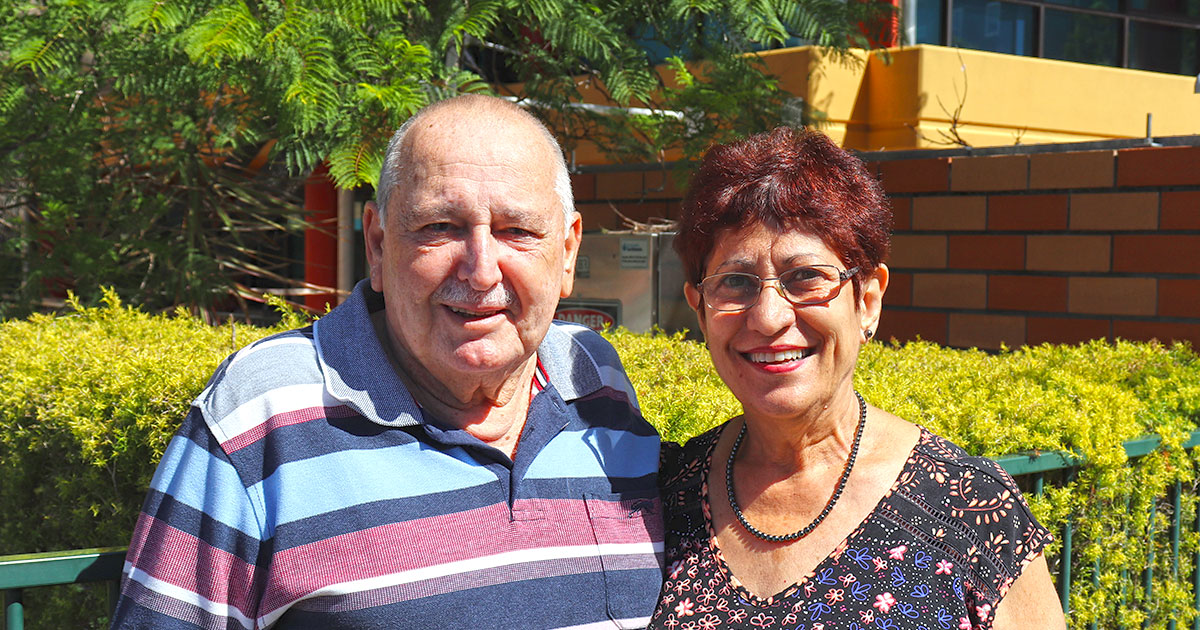Len walks out of hospital 110 days after being told he would never walk again

In September 2022 Len was told he would never walk again after contracting Guillain-Barré syndrome following a COVID-19 infection, 110 days later he walked unassisted out of The Wesley Hospital.
Len, 73 is a beloved member of the Innisfail community in North Queensland and runs a popular deli in his home town.
Len contracted COVID-19 in September 2022 and quickly became unwell. He presented to the Innisfail Hospital and was transferred to the Cairns Base Hospital Intensive Care Unit where tests showed he had Guillain-Barré syndrome.
Guillain-Barré syndrome is a rare neurological disorder, where the immune system attacks the nerves outside of the brain and spinal cord. Symptoms include weakness and loss of feeling in the limbs, vision problems, difficulty breathing, abnormal heartbeat, and digestive issues.
Len experienced complete paralysis which is the most extreme case of Guillain-Barré syndrome, causing enormous distress for his wife, children and grandchildren.
“I was in an incredible amount of pain and my family were told my life was hour by hour, I was given my last rights and placed in an induced coma,” Len said.
“While I was in the ICU I do remember hearing my daughter, singing to me from outside the room.”
The exact cause of Guillain-Barré syndrome is unknown however research has shown around 70 per cent of patients develop symptoms following a viral infection like COVID-19.
Wesley Hospital Neurologist Dr Robert Henderson said COVID-19 has been associated with numerous neurological complications including Guillain-Barré syndrome.
“Len’s condition was on the more severe end of the Guillain-Barré syndrome spectrum and the association with COVID-19 is very rare but important to recognise,” Dr Henderson said.
While at the Cairns Base Hospital Len’s condition did not improve and he began experiencing issues with his bladder.
“Eleven years ago, I had prostate cancer and I developed radiation cystitis following my treatment, this flared up again while I was being treated in Cairns,” Len said.
“My family worked tirelessly to transfer me down to The Wesley Hospital where I had previously been treated by Urologist Dr John Yaxley.
“They were able to get me on a flight with the Royal Flying Doctor’s Service and was taken straight to The Wesley.”
A multidisciplinary specialist medical team was mobilised to care for Len bringing together Urology, Neurology, Haematology, Respiratory, Rehabilitation, Hyperbaric treatment and allied health.
Len was facing two very severe health battles at once, the Guillain-Barré syndrome which had impacted his gross motor skills leaving him unable to walk and the radiation cystitis in his bladder which was causing bleeding and severe pain.
“To treat my bladder, Dr Yaxley sent me to the Hyperbaric Oxygen Therapy Clinic, it was amazing and I began to see improvement straight away,” Len said.
Hyperbaric therapy can increase plasma oxygen concentration in the blood stimulating new capillary and tissue growth for healing, the hyperbaric treatment began to heal Len’s bladder and stop the bleeding.
Associate Professor Graeme Kay is the Director of the clinic and said Len responded very well to his treatment.
“Cancer by definition is rapidly producing cells without control, the radiation therapy Len had during his prostate cancer treatment destroyed the cells ability to copy themselves and thus the cancers ability to grow,” A/Prof Kay said.
“Unfortunately, radiotherapy can also impact the normal cells, while in the hyperbaric chamber patients are breathing pure oxygen thus increasing the oxygen supply to the cells tissue and encouraging new blood vessels to grow and heal themselves.”
The second part of Len’s treatment involved intensive rehabilitation to treat the paralysis caused by the Guillain-Barré syndrome.
“I saw the physiotherapists every day who were amazing at getting me up and walking, I went from not being able to stand in October to walking independently without support in December,” Len said.
On the 21 December Len was officially discharged from The Wesley Hospital just in time for Christmas, he had spent a total of 110 days in hospital between Innisfail, Cairns and Brisbane.
“I credit my recovery to my amazing family and my wife. There was not a single day where I did not have someone come to visit me,” Len said.
“Their love, support, encouragement and advocacy are what kept me going, plus all the community in Innisfail who were constantly calling to check in on me.”
“We have a saying in rural and remote communities – when in pain, get on a plane and I am so glad that I did.”
Len is hopeful that by sharing his story he can raise awareness of Guillain-Barré syndrome and maybe even provide hope for other patients.














